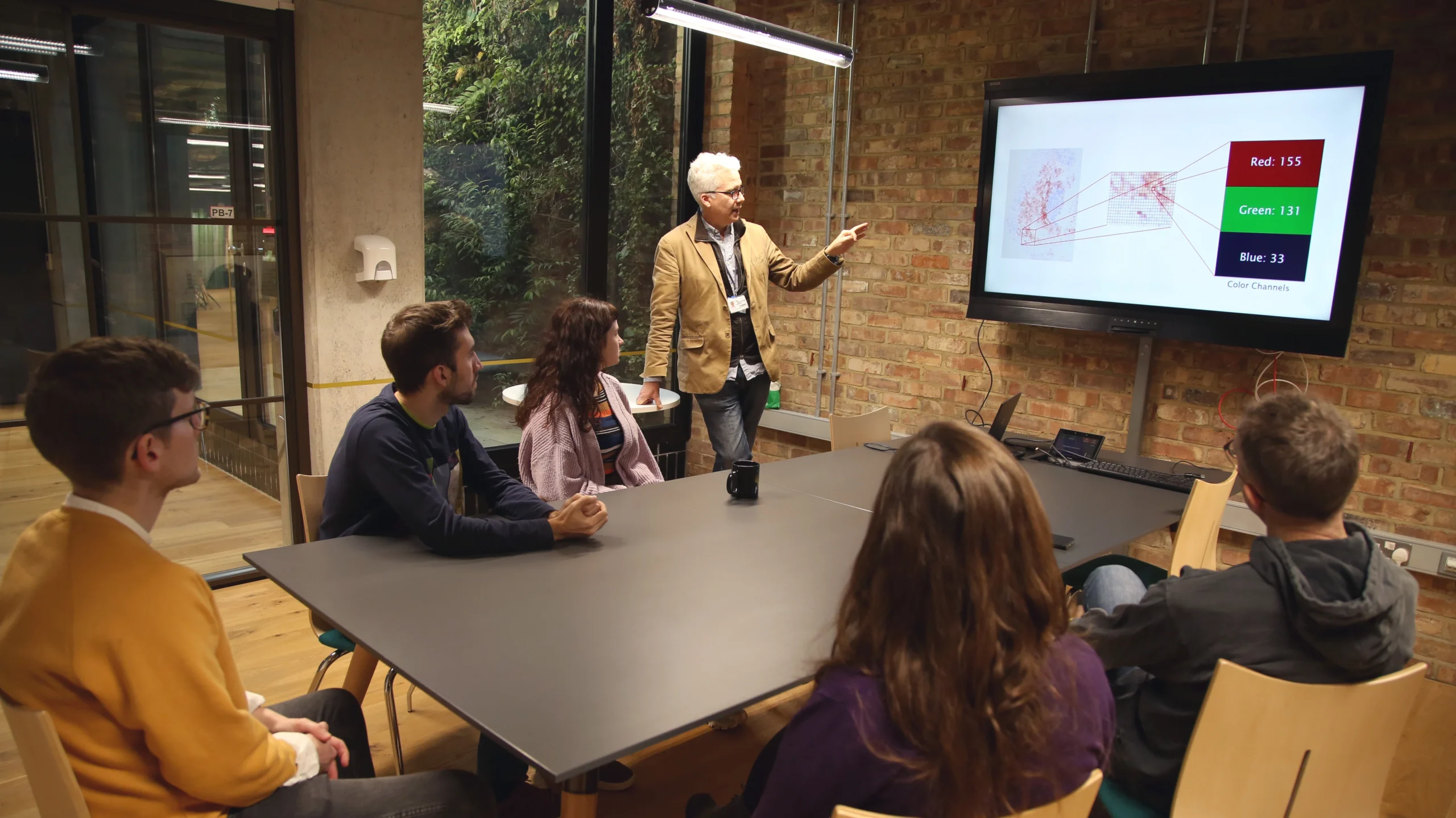Queen Mary University of London joins ELIXIR-UK
Queen Mary University of London has officially joined ELIXIR-UK. The application submitted by Queen Mary outlined a robust plan to contribute to ELIXIR-UK’s mission to support life science research, focusing on interdisciplinary cooperation, data management and advanced analytics.
The UK Node of ELIXIR proudly welcomes Queen Mary University of London into its network, further expanding its reach and impact. With this latest addition, ELIXIR-UK comprises 28 UK research-performing organisations dedicated to advancing scientific research and innovation.
Queen Mary’s commitment to promoting ELIXIR-UK’s mission
Queen Mary’s commitment to promoting ELIXIR-UK visibility will be spearheaded by two key data-focused groups: the Digital Environment Research Institute (DERI) and the Centre for Translational Bioinformatics (C4TB).
- The Digital Environment Research Institute (DERI) is a multidisciplinary hub for digital, data science, and AI research. DERI fosters innovation through regular seminars, workshops, and collaborations with academic and industry partners. As the primary interface between Queen Mary and The Alan Turing Institute, DERI is well-positioned to integrate and promote ELIXIR-UK’s initiatives.
- The Centre for Translational Bioinformatics (C4TB) within Queen Mary’s Faculty of Medicine and Dentistry will facilitate interdisciplinary cooperation, supporting ELIXIR working groups by bridging computational biology with medical research.

Michael Barnes teaching in one of the DERI rooms at Queen Mary.
Three key ELIXIR-aligned research themes
AI for Drug Discovery (AIDD) Academy
A standout contribution from Queen Mary is the AI for Drug Discovery (AIDD) Academy, a collaborative training partnership with Exscientia, MSD, and Heptares funded by the BBSRC. The AIDD Academy is set to offer 21 fully funded studentships, promoting interdisciplinary training that addresses ELIXIR’s data challenges. By aligning PhD projects with industry and academic expertise, AIDD aims to expedite innovation in drug discovery.
AIDD also contributes to setting standards for interoperability, a core ELIXIR objective, and can enhance ELIXIR’s Training platform with new educational resources tailored to Al in life sciences
Genomic medicine and rare disorder research
Queen Mary’s leading role in the UK 100,000 Genome Project (UK100KG) underscores its commitment to genomic medicine. Researchers from Queen Mary have developed significant tools, like the Exomiser open-source software, which is widely used in rare disease diagnostic pipelines globally. These tools, along with Queen Mary’s expertise in phenotype-driven variant prioritisation, will augment ELIXIR’s Rare Disease registry and infrastructure.
They have also been leading software development for the Global Alliance for Genomics & Health (GA4GH) Phenopackets product.
Phenopackets offer a human and machine-readable way to structure clinical and phenotypic data about an individual. Researchers within the organisation conducting rare disease research, including Mendelian discovery and genotype-phenotype correlations, would benefit from the existing ELIXIR Rare Disease Infrastructure.
Data Stewardship for biomarker discovery and precision medicine
Before applying to join ELIXIR-UK, Queen Mary had already collaborated with ELIXIR-UK. Sandra Ng, a key team member at Queen Mary, is a selected Fellow of the ELIXIR-UK Fellowship on data stewardship. Her work focused on making clinical data FAIR (Findable, Accessible, Interoperable, and Reusable).
“My journey with ELIXIR UK began as a Fellow on the DASH programme – it was a positive and enriching experience. Since then, I’ve continued my involvement through the Biohackathon and various communities and clubs. As an early career researcher, I’ve had invaluable opportunities to network and collaborate with leaders in the life sciences. I was eager for Queen Mary to join ELIXIR-UK so that other peers could benefit from and contribute to its fantastic resources and network.”
Sandra Ng, ELIXIR-UK Data Stewardship Training Fellow
Sandra’s work in ELIXIR-UK is tightly linked with promoting FAIR data for immune-mediated inflammatory diseases through consortia like IMID-Bio-UK, CLUSTER, and IMI NECESSITY.
Queen Mary’s efforts in managing and curating datasets allow for easier comparison across datasets, allowing researchers to predict drug response using biomarkers to define common and unique mechanisms of disease progression.
Commitment to ELIXIR-UK’s Mission
Queen Mary’s application reflects a deep alignment with ELIXIR-UK’s mission to build a sustainable infrastructure for biological information. With strong interdisciplinary expertise, cutting-edge tools, and a commitment to data stewardship and innovation, Queen Mary is poised to significantly enhance ELIXIR-UK’s capabilities, expertise and breadth.
_____________
Queen Mary University of London members are encouraged to explore the opportunities for involvement with ELIXIR. Whether through signing up for the UK Groups and Communities, the wide ELIXIR Focus Groups and Communities, or reaching out directly, the university community can actively contribute to the Node’s initiatives. Contact us to know more.
About ELIXIR-UK
ELIXIR-UK is part of the European ELIXIR infrastructure, which supports life science research and its translation to medicine, the environment, and society. By integrating national bioinformatics resources, ELIXIR-UK aims to provide a sustainable infrastructure for biological information, ensuring that data is effectively managed, analysed and shared across the scientific community.
For organisations interested in becoming part of ELIXIR-UK and enhancing their involvement in biological data research, you can contact the Node Coordination office for further details on the application process at [email protected]
Notes to editors
About ELIXIR-UK
ELIXIR-UK is part of the European ELIXIR infrastructure, which supports life science research and its translation to medicine, the environment, and society. By integrating national bioinformatics resources, ELIXIR-UK aims to provide a sustainable infrastructure for biological information, ensuring that data is effectively managed, analysed and shared across the scientific community.
For further details, reach out to us at [email protected]